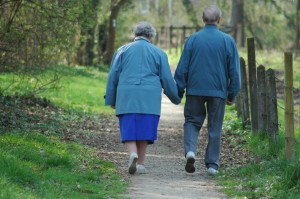Humans Can Sniff Out Old Age in Others
How old do you think you smell? A new study suggests that humans possess the ability to judge whether a person has reached their senior years just by sniffing their body odor.
People in the study correctly gauged whether the former wearer of an underarm pad was elderly or not just by sniffing it. And for the record, most didn’t think “old-people smell” was off-putting at all.
The finding “shows that there’s yet another signal hidden in the body odor that we are somehow able to extract and make use of,” said study co-author Johan Lundstrom, an assistant professor at the Monell Chemical Senses Center, in Philadelphia.
As for the notion that “old-people smell” doesn’t leave people as disgusted as you might expect, Lundstrom said the odor’s power — or lack thereof — appears to have a lot to do with whether the elderly are actually physically present. “Lacking a context, the negativity of the body odors disappear,” he said.
The study authors launched their research as part of an effort to better understand the chemical signals that people detect in body odor. Previous research had suggested that we can pick up signs of sickness in other people’s body odor and even get a sense of whether someone is related to us, Lundstrom said.
Animals appear to be able to detect age through body odor, he said, although it’s not clear why it might matter to them. One theory is that the signal could let other animals know that an animal is older and thus more likely to produce offspring because it’s managed to stay alive so long, he said.
In the new study, 56 people — 20 young (20 to 30 years old), 20 middle-aged (45 to 55), and 16 elderly (75 to 95) — wore clean T-shirts and underarm pads while sleeping. The pads soaked up a sample of each individual’s body odor.
The researchers then asked 41 young people to smell the resulting odors — from pads kept in glass jars — and try to tell them apart.
Participants were generally able to discriminate between the age groups, but they weren’t much better at it than chance, Lundstrom said. However, they were able to do a better job of grouping together body odors from older people and identifying them as coming from the elderly.
“The old-age body odor sticks out,” Lundstrom said, but it didn’t do so in a negative way. In fact, the subjects tended to think the old age body odors were more pleasant and less intense than those of other age groups.
One factor might explain that: Older men smell more like women, possibly because they’ve lost testosterone, Lundstrom said.
He also noted that the people who provided their body odor for the study were healthy. That means the older people did not suffer from problems that can occur among seniors that might affect their body odors, such as incontinence.
The “popular prejudice” against the odor of the elderly probably reflects people’s distaste for odors in geriatric wards and nursing homes, noted one expert, Tim Jacob, a professor of biosciences at Cardiff University, in England, who studies smell and is familiar with the new study’s findings.
“This is obviously an unfair association,” he said. “But if people know where the smell originates [that is, in an older person], they may be unconsciously or consciously prejudiced. In this study they did not know where the smell originated.”
So how might people be able to detect old age through smell? It’s not clear, Lundstrom said. One possibility is that we’re not detecting old age specifically, but instead a signal that “piggybacks” on chemical signs of disease in the elderly, he said.
In the big picture, “given the research showing the importance of the olfactory — smell — system among other animal species, it is likely that humans possess similar capabilities that we don’t yet fully understand, yet influence our behavior more than we realize,” said Elizabeth Krusemark, a smell researcher and postdoctoral fellow at the University of Wisconsin Madison’s Cognitive and Affective Neuroscience Lab.
 People ages 60 and older who received free bus passes undertook significantly more physically active forms of travel — such as walking or taking the bus — than those who didn’t, a British study found.
People ages 60 and older who received free bus passes undertook significantly more physically active forms of travel — such as walking or taking the bus — than those who didn’t, a British study found.